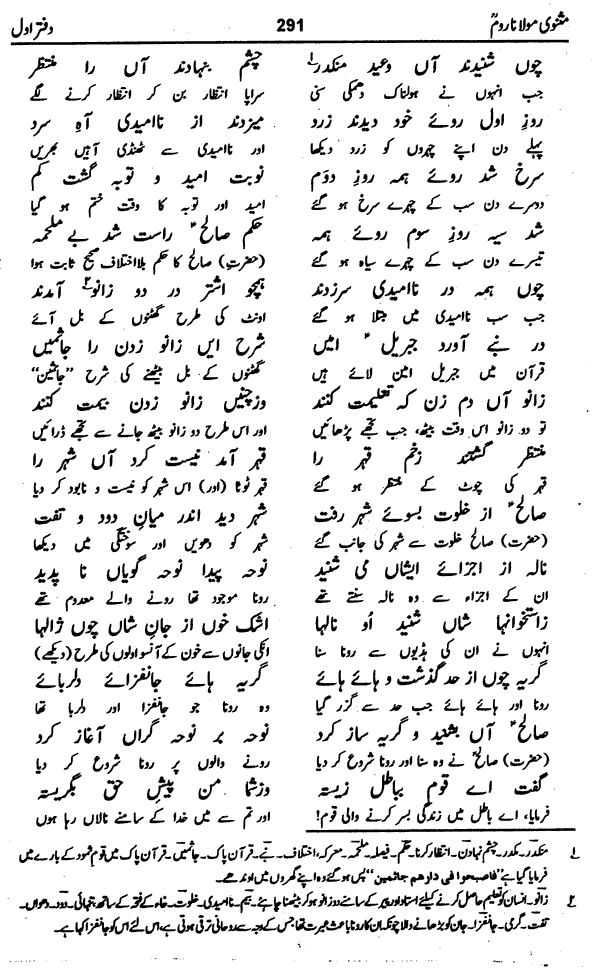How the eyes of (external) sense regarded Sálih and his she-camel as despicable and without a champion; (for) when God is about to destroy an army He makes their adversaries appear despicable and few in their sight, even though the adversary be superior in strength: “and He was making you few in their eyes, that God might bring to pass a thing that was to be done.”
The she-camel of Sálih was in (outward) form a camel: that bitter (graceless) tribe hamstrung (and slaughtered) her in their folly.
God's she-camel drank water from brook and cloud: they (really) withheld God's water from God.
The she-camel of Sálih became, like the bodies of righteous men, an ambush for the destruction of the wicked,
That (you may see) what (the Divine command), Let God's she-camel have her portion of water, wrought against that people, through the ordainment of death and woe.
The vengeance, which is God's minister, demanded from them an entire town as the blood-price of a single camel.
The Sálih-spirit is not susceptible to afflictions: the blows fall on the camel (body), not on the essence (spirit). No one gains victory over their (the saints') hearts: harm comes (only) to the oystershell, not to the pearl.
The Sálih-spirit is not capable of being hurt: the light of God is not subject to infidels.
The Soul (God) attached to it (the spirit) the earthly body, that they (the infidels) might hurt (it) and suffer tribulation,
Be a slave to the camel, which is the saint's body, that you may become the fellow servant of the Sálih-spirit.
Sálih said (to the people of Thamúd), “Inasmuch as ye have shown this envy, after three days the punishment will arrive from
God.
After three more days there will come from the Taker of life a calamity that has three signs.
On the first day your faces will be like saffron, on the second your faces will be red like arghawán (flowers of the Judas-tree). On the third, all your faces will become black: after that, the vengeance of God will arrive.
If ye desire from me the sign of this threatened chastisement, the she-camel's foal has run towards the mountains:
If ye can catch him, there is help (for you); else the bird of hope has surely escaped from the snare.”
Sálih said, “Ye see, the (Divine) destiny has been ratified and has beheaded the phantom of your hope.”
What is the she-camel's foal? His (the saint's) heart, which ye may bring back to its place (win again) by means of well-doing and piety.
If his heart comes back (is reconciled), ye are saved from that (Divine punishment); otherwise ye are despairing and biting your fore-arms (in remorse).
When they heard this dark threat, they cast down their eyes and waited for it (to be fulfilled).
On the second day the faces of all became red: the time for hope and repentance was (irretrievably) lost.
On the third day all their faces became black: the prediction of Sálih came true without (possibility of) dispute. When they all were cast away (and plunged) in despair, they fell on their knees, like (crouching) birds.
Gabriel, the trusted (angel), brought in the Qur’án the description of this kneeling, (which is described by the word) játhimín.
He heard (the sound of) wailing from their limbs: the lamentation was plain (to hear), those who uttered it (were) invisible.
He heard wailings from their bones: tears of blood (poured) from their spirits, like hailstones.
God said (to me), ‘Have patience with their iniquity: give them counsel, not much remains of their (allotted) period.’ I said, ‘Counsel is barred by ill-treatment: the milk of counsel gushes forth from love and joy.
Much ill-treatment have they bestowed on me, (so that) the milk of counsel is curdled in my veins.’
I went (back) once more to admonition, I spake parables and words (sweet) as sugar, I produced fresh milk from the sugar, I mingled milk and honey with my words.
In you those words became like poison, because ye were filled with poison from the root and foundation.
2555. How should I be grieved that grief is overthrown? Ye were grief (to me), O obstinate people.
Does any one lament the death of grief? Does any one tear out his hair when the sore on his head is removed?” (Then) he turned to himself and said, “O mourner, those folk are not worth your mourning.”
Recite correctly—do not regard my misquotation—(the words in the Qur’án) “Say, how shall I be grieved for an unjust people?”
Again he felt a weeping in his eye and heart: an uncaused (involuntary) compassion shone forth in him.
His intellect was saying, “Wherefore is this weeping? Ought one to weep for such scoffers?
Tell me, what art you weeping for? For their fraud? For the host of their ill-shod (miserable) hatreds? For their murky hearts full of rust? For their venomous snake-like tongues?
For their sagsár-like breath and teeth? For their mouths and eyes teeming with scorpions?
Their hands are perverse, their feet perverse, their eyes perverse, their love perverse, their peace perverse, their anger perverse.”
For the sake of blind conformity and (for the sake of following) the standards of tradition, they set their feet (trampled) on the camels of Reason, the venerable guide.
They were not eager for a guide (pír-khar): they all had become (like) an old donkey (pír khar) from paying hypocritical observance to each other's eyes and ears.
God brought the (devout) worshippers from Paradise that He might show unto them the nurslings of Hell-fire.






No comments:
Post a Comment